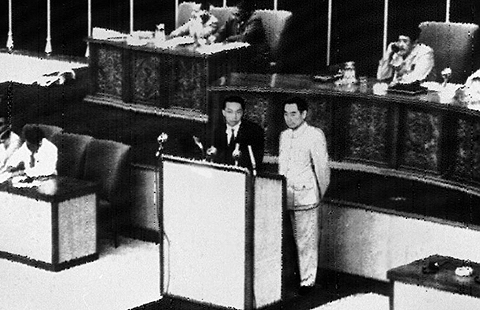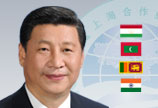
60 years on, Bandung Spirit remains relevant
Updated: 2015-04-22 10:53
(Xinhua)
Comments Print Mail Large Medium SmallBANDUNG, Indonesia - Sixty years ago, the city of Bandung witnessed a historic gathering of representatives from newly independent countries in Asia and Africa; today, it is revisiting the very principles agreed upon at the epoch-marking conference.
Although the global political and economic landscapes have undergone great changes in the past six decades, the wisdom in the Bandung Spirit still applies today.
In 1955, when delegates from 29 Asian and African countries gathered in Bandung, their countries had just shaken off the shackles of colonialism or imperialism.
They were brought together by a common aspiration for peaceful coexistence among themselves and beyond, and also for closer cooperation among those once being oppressed so that they as a whole could have a say on the world stage, instead of being dictated to by outside powers.
The much-acclaimed Ten Principles of Bandung underscored respect for fundamental human rights, respect for sovereignty and territorial integrity, equality of all nations large and small, as well as non-intervention and non-interference in the internal affairs of another country.
These are golden rules guiding relations between countries and they remain as true today as they were 60 years ago.
As for the part of the document that is more reflective of the realities then, it is also relevant if attuned to the current global political economic background.
Compared with 60 years ago, the harmful legacies of colonialism have largely been removed, and peace and development have become the overriding theme.
Moreover, both Asia and Africa are playing an increasingly significant role on the global stage: with Asia being the primary engine for the global economy and Africa considered a continent of hope that would soon unleash its enormous growth potentials.
In response to the call of the time, followers of the Bandung Spirit should shift their focus gradually from peaceful coexistence to common development, from seeking common ground while shelving differences to pursuing win-win cooperation.
By forging even closer cooperation for development, countries in Asia and Africa will be able to realize growth at comparatively lower cost given their economic complementarity, and better address challenges such as the "Middle Income Trap."
Meanwhile, by supporting each other in global politics and striving to speak with one voice regarding the rights of developing nations, Asian and African countries could collectively win a higher global status for themselves, and improve the global decision-making system that is still shockingly biased against them.
When they convened for the first time, they were merely a grouping of "the despised, the insulted, the hurt, the dispossessed," as Richard Wrights writes about the 1955 Asia-Africa Conference in his book, The Color Curtain.
Starting from Bandung, they became a force to be reckoned with. And one could believe in good faith that Asian and African countries will take advantage of the momentum brought about by the 60th anniversary of the Bandung Conference to score even more formidable achievements.
Related Stories
Bandung Conference boosts Afro-Asian countries' struggle for independence: Vietnam's vice FM 2015-04-21 14:28
Commentary: Bandung Spirit still relevant in today's world 2015-04-21 11:15
Afghan politician sees Bandung spirit still aspirant in modern days 2015-04-14 17:43
Schedule
Chinese President Xi Jinping will visit Pakistan and attend the Asian-African Summit and activities commemorating the 60th anniversary of the Bandung Conference in Indonesia from April 20 to 24.
April 22
Attend the opening ceremony of the Asian-African Summit;
Meeting with Indonesian President Joko Widodo;
April 23
Bilateral meetings;
Attend the closing ceremony of the Asian-African Summit;
April 24
Historical walk from Savoy Homann Hotel to Gedung Merdeka;
Attend activities commemorating the 60th anniversary of the Bandung Conference;
Feature




